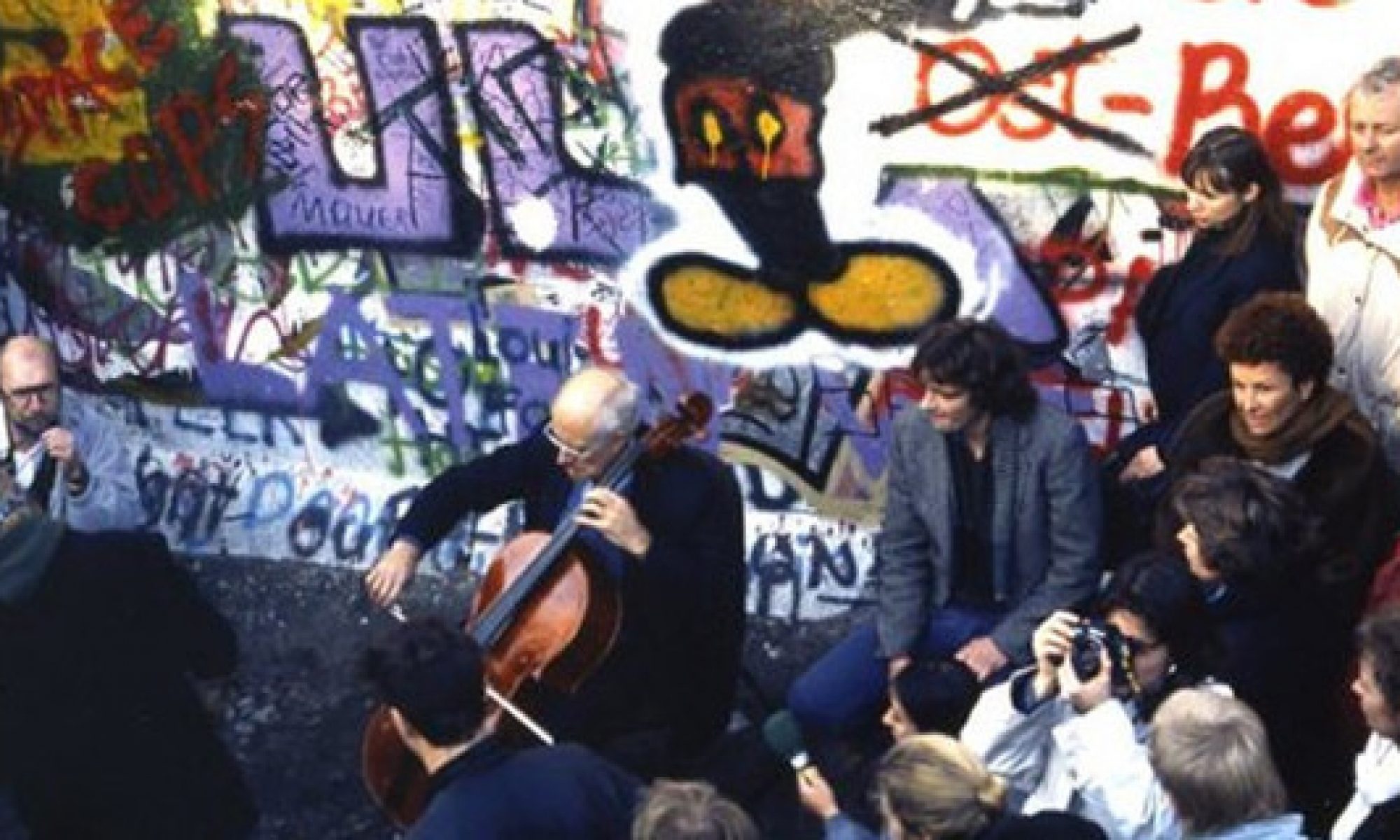Brief Background
Prior to and during World War II, was under Nazi occupation. After the end of the war, the Soviet Union brought Czechoslovakia behind the Iron Curtain as a satellite state. Under the reign of communist rule, a hotbed of social dissent grew in Prague (the capital) as all free expression was monitored and censored by the USSR. From 1948 to 1989 Czechoslovakia would remain a satellite of the USSR, and in 1993 Czechoslovakia amicably split into nations the Czech Republic and Slovakia.[1] For the purpose of this presentation, the focus of study will be centered in Prague as I will argue that while the rock band The Plastic People of the Universe did not necessarily make political music, their influence of and support from fellow artists catalyzed one of the greatest human rights protests of the 20th Century.
Prague as a USSR Satellite State, Prague Spring, and the Czech Underground
Earlier in this semester, we discussed the aesthetic of Socialist Realism in the USSR prior and during the Stalin regime. We discussed what art “ought to be” and how frequently it seemed that there was a struggle within Soviet leadership to determine what was good music, and the only real criteria they had for the bulk of the period was to not be western in style. Pushing forward by 30 years and moving to Prague, the objection to aesthetic of Socialist Realism and desire for Western sound (and goods) gave rise to the Czech rock band, The Plastic People of the Universe. As undesiring member of the Eastern Bloc, the younger residents of Prague began to resist the communist regime.[2]
The 1950s and early 1960s were brutal in Czechoslovak, but in 1968 something fascinating happened, there was a brief moment of free expression from January to August as leadership of the communist party switched hands to Alexander Dubček. This is when western hippie culture was allowed to briefly infiltrate Prague. This is when rock ‘n’ roll started to blast through the iron curtain.[3] In this short period of time a The Plastic People of the Universe formed; however, after the Warsaw Pact Armies marched into Prague in August, making the type of music the PPU wanted to would not be easy. Because of the tightly monitored and censored state they lived in, all of the instrumentation they need to preform was government property and they would have to audition in order to be allowed to use them. However, it was not that their music was outright politically motivated, but more to do with their lyrics. They were denied due to “the songs subvert[ing] the compulsory poetics of socialist realism, focusing on vomiting at the age of twenty, constipation, and drinking rubbing alcohol.”[4]
Committed to making music, the members of the band would save money to buy in their own instruments, but then they ran into the issue of policing. The PPU would have shows that were frequently shutdown or cancelled by the authorities since they did not have the “professional” classification. In 1972 for about two weeks they were granted the proper license to play in the public, but it was revoked due to claims that the music would have a “negative social impact.”[5] The trajectory of the band continued in this fashion, and eventually they decided to “move underground.” To move underground, means that they tried their best to escape the purview of the government. This is how when they met the human rights advocate and playwright Vaclav Havel who would go on to become the last president of Czechoslovakia and the first president of the Czech Republic.

Their Arrest, Vaclav Havel and Charter 77
After The Plastic People of the Universes Move to the underground, they started to connect with other dissectors. In 1976 there was a raid done by the secret police at a music festival and arrested twenty-seven musicians, including the members of The Plastic People of the Universe. Paul Wilson, one of their vocalists and native Canadian, was deported from the country due to the arrest. When the band was forces to stand trial six months later, their song lyrics were sighted as corrupting, but they responded by interesting that they were not necessarily making political music, but they were “defending their right to write and sing the songs they wanted.”[6] Through their own defense of their lyrics they made a stand of human rights. This worked in their favor and where Havel becomes a very important to the legacy of The Plastic People of the Universe.
As a playwright, Havel fervently believed in free expression as evident in his plays that are loudly political. Due to The Plastic People of the Universe defense, the underground was inspired to finally petition their government unlike they had prior to the trial. With Havel as the principal writer they started to write would become Charter 77. In line with the Helsinki Agreements and the United Nations Declaration of Human Rights, this charter demanded that the Czechoslovakian people be granted the rights their government was agreed to with signing the agreement and declaration.
As evident by the excerpt below, Charter 77 set out to remind the government of its commitment to the international community and its people.
We accordingly welcome the Czechoslovak Socialist Republic’s accession to those agreements. Their publication, however, serves as a powerful reminder of the extent to which basic human rights in our country exist, regrettably, on paper alone. The right to freedom of expression, for example, guaranteed by Article 19 of the first-mentioned covenant, is in our case purely illusory. Tens of thousands of our citizens are prevented from working in their own fields for the sole reason that they hold views differing from official ones, and are discriminated against and harassed in all kinds of ways by the authorities and public organizations. Deprived as they are of any means to defend themselves, they become victims of a virtual apartheid.[7]
Additionally, they asserted that is the beginning of demand for civil rights that will not be quailed until everyone has the same rights as the other.
Responsibility for the maintenance of rights in our country naturally devolves in the first place on the political and state authorities. Yet not only on them: everyone bears his share of responsibility for the conditions that prevail and accordingly also for the observance of legally enshrined agreements, binding upon all individuals as well as upon governments. It is this sense of co-responsibility, our belief in the importance of its conscious public acceptance and the general need to give it new and more effective expression that led us to the idea of creating Charter 77, whose inception we today publicly announce.[8]
They ended the charter by signing it from all of Prague, itself making a statement of resistance.
Conclusion
Eventually, through international outrage most of the members of The Plastic People of the World were released, and by the end of the 1980s the communist control over Czechoslovakia waned until the yoke was thrown off in 1989 after Velvet Revolution protests in Wenceslas Square. While The Plastic People of the Universe were not the focal points of the protest, as in they did not perform, their role as a galvanizing force behind Charter 77 changed the course of Czech History, European History, and World History. As a result, they exemplify that protest music does not necessarily have to lyrically explain what they are against, just the shear act of making music that does not fit an aesthetic can be enough to spark change.
Bibliography
Charter 77. “Declaration of Charter 77 .” Making the History of 1989. 1976. http://chnm.gmu.edu/1989/items/show/628 (accessed October 16, 2019).
Jonssonová, Pavla. “The Plastic People of the Universe.” Oxford Music Online, 2019.
Lagasse, Paul. Czechoslovakia . 2018. https://libproxy.washjeff.edu/login?url=https://search.credoreference.com/content/entry/columency/czechoslovakia/0?instituti (accessed October 2019, 2019).
Teodor, Mihaela. “Plastic People of the
Universe’ Rock and Roll, Human Rights and the Velvet Revolution.” Valahian
Journal of Historical Studies , December 2009: 29–39.
[1] Paul Lagasse. Czechoslovakia . 2018. https://libproxy.washjeff.edu/login?url=https://search.credoreference.com/content/entry/columency/czechoslovakia/0?instituti (accessed October, 2019).
[2] Pavla Jonssonová. “The Plastic People of the Universe.” Oxford Music Online, 2019.
[3] Mihaela Teodor. “Plastic People of the Universe’ Rock and Roll, Human Rights and the Velvet Revolution.” Valahian Journal of Historical Studies, (December 2009), 32.
[4] Jonssonová. “The Plastic People of the Universe.”
[5] Teodor. “Plastic People of the Universe,” 34.
[6] Ibid, 35.
[7] Charter 77. “Declaration of Charter 77 .” Making the History of 1989. 1976. http://chnm.gmu.edu/1989/items/show/628 (accessed October 16, 2019).
[8] Ibid.

